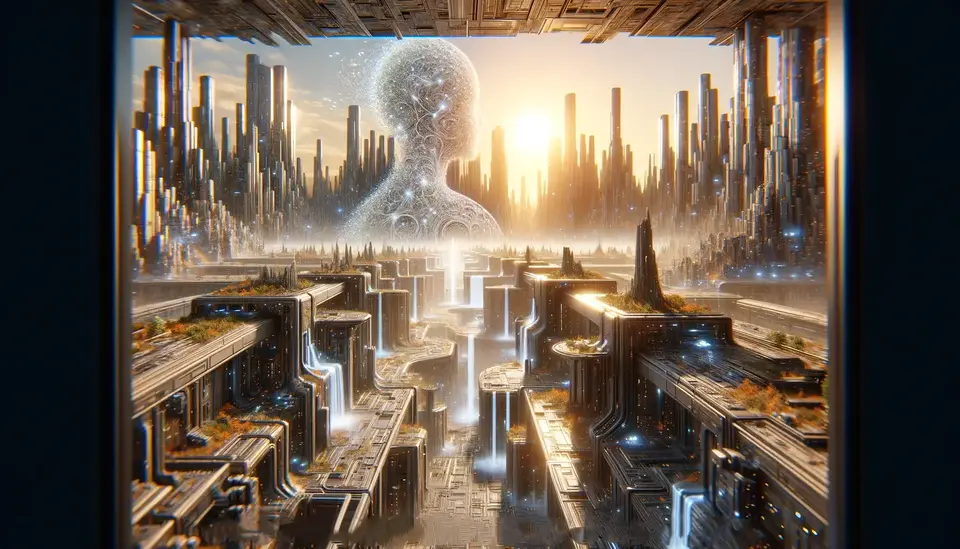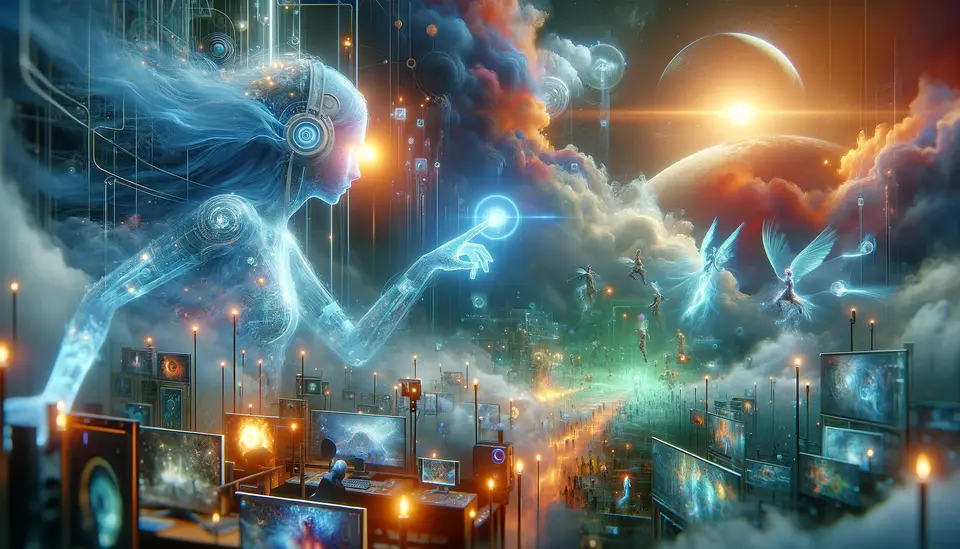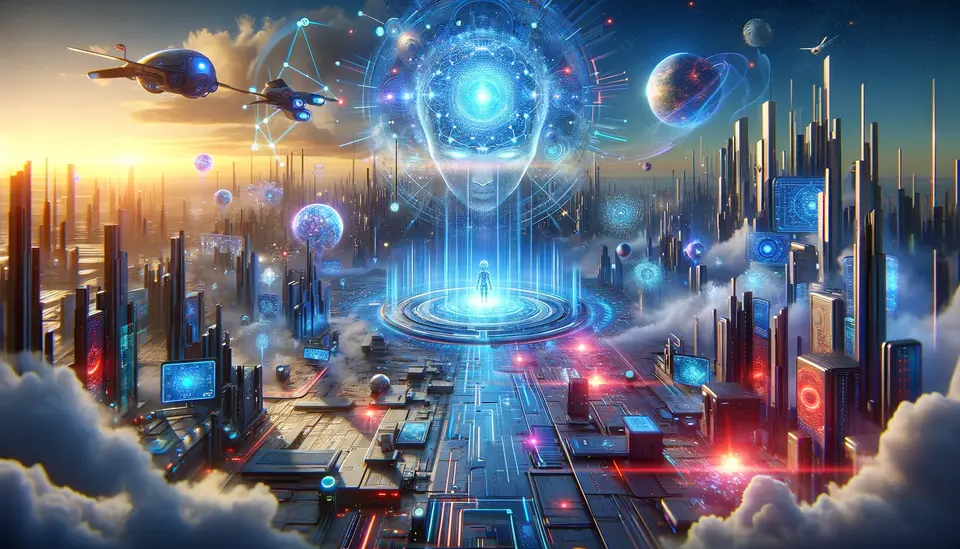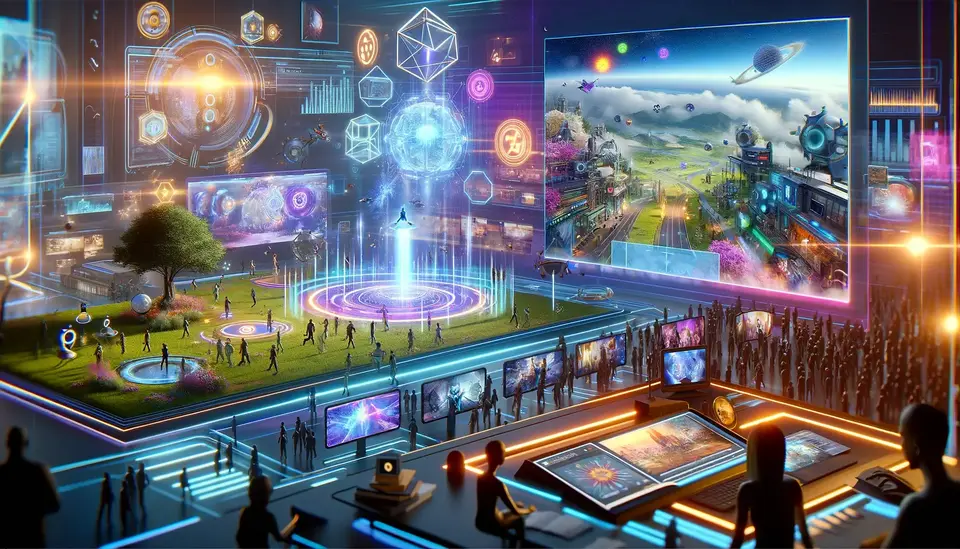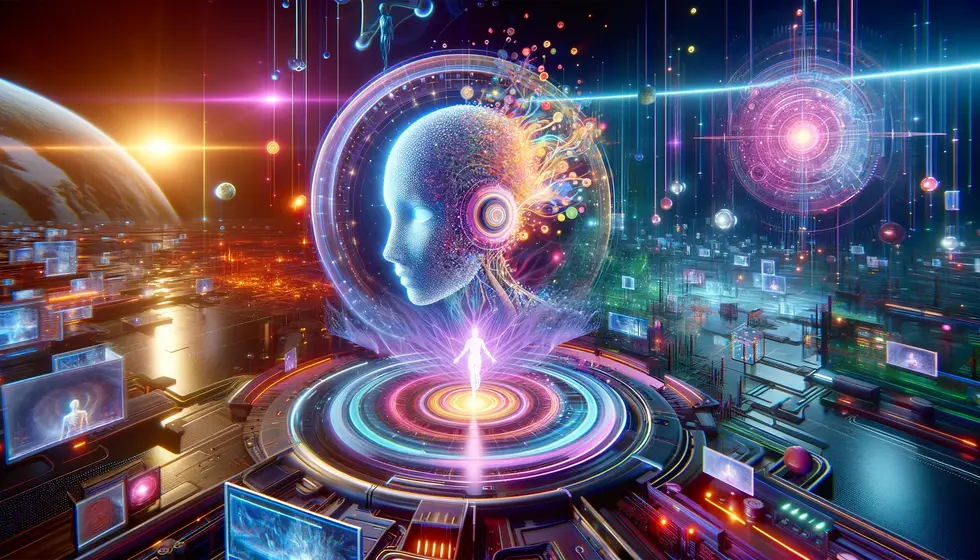The Evolving Role of Artificial Intelligence in the Metaverse
Posted on February 8, 2024 8 minutes 1698 words
Table of contents
Introduction
Imagine stepping into a world where your digital surroundings adapt seamlessly to your preferences, where virtual landscapes evolve in real-time, and where every experience feels tailored just for you. This is not a glimpse into a distant, sci-fi future; it’s the burgeoning reality of the Metaverse, an expansive digital universe that’s being sculpted by the hands of Artificial Intelligence (AI).
The Metaverse, a term that has captured the imagination of tech enthusiasts and industry professionals alike, refers to a collective virtual shared space, created by the convergence of virtually enhanced physical reality and physically persistent virtual spaces. It’s here, in these boundless realms, that AI is not just a feature but a cornerstone, driving innovation and personalization.
In this blog post, we will delve into the multifaceted role of AI within the Metaverse. From crafting personalized experiences that resonate with each individual to sculpting ever-changing virtual environments that respond to user interactions, AI is the invisible yet omnipresent architect of these new worlds. We will also touch upon the ethical implications and future trends, providing a comprehensive view of AI’s integration into virtual reality.
As we embark on this exploration, remember, the intersection of AI and the Metaverse isn’t just about technology; it’s about the creation of experiences, memories, and perhaps even new aspects of our very identity. So, let’s dive in and discover how AI is shaping the future of our digital interactions and transforming the way we perceive and engage with virtual worlds.
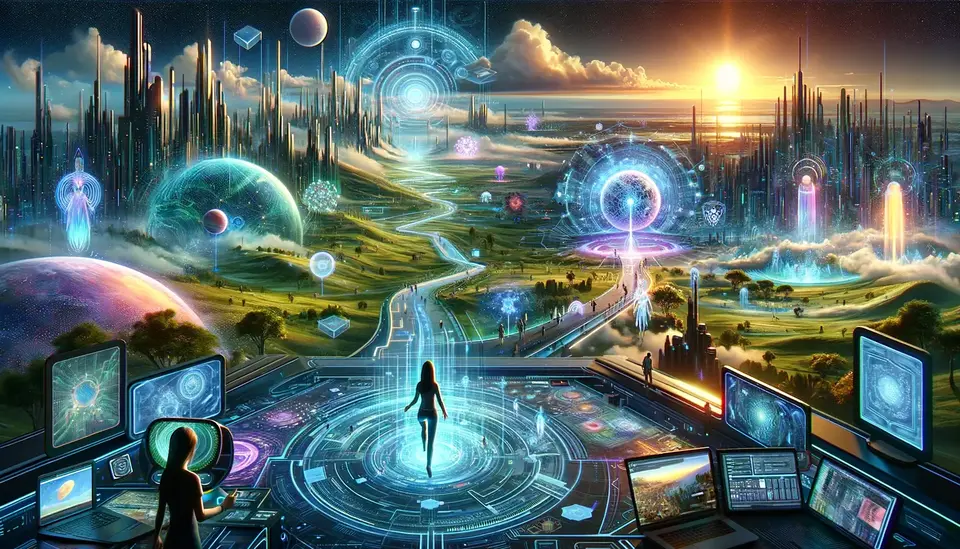
AI-Driven Personalization in the Metaverse
In a realm as vast and diverse as the Metaverse, personalization is not just a luxury; it’s essential. This is where Artificial Intelligence steps in, transforming the Metaverse from a one-size-fits-all environment to a personalized universe that adapts and evolves with each user.
Understanding User Preferences
AI excels at understanding and predicting user preferences. By analyzing data from user interactions within the Metaverse, AI algorithms can identify patterns in behavior, preferences, and even emotional responses. This data-driven insight allows for the customization of experiences, from the aesthetic appeal of environments to the types of challenges and interactions presented to the user.
Customized Avatars and Environments
One of the most prominent examples of AI-driven personalization is the creation of customized avatars. AI can suggest avatar modifications based on user behavior, ensuring that each avatar is a unique digital representation of the individual. Similarly, virtual environments can also be tailored. Imagine entering a virtual space that knows your favorite colors, the landscapes you find most relaxing, or the architectural styles that intrigue you. AI makes this level of personalization possible.
Impact on Engagement and Retention
The impact of this personalization is profound. Users are more likely to spend time in environments that feel personally relevant and engaging. This heightened engagement leads to increased retention, as users form a deeper connection with the Metaverse. For businesses and developers, this means creating experiences that are not just visually stunning but are also emotionally resonant with users.
The Balancing Act
However, personalization must be balanced with variety and discovery. AI systems need to be designed to introduce users to new experiences, preventing the personalization bubble from becoming too narrow. This ensures that while the Metaverse feels personal, it also remains a space of endless exploration and novelty.
AI and the Creation of Virtual Environments
The Metaverse is an ever-expanding universe of virtual environments, each more intricate and immersive than the last. The creation and management of these spaces are increasingly reliant on the sophisticated capabilities of AI.
Designing Complex Virtual Spaces
AI’s role in designing virtual environments is multi-faceted. Advanced algorithms can generate intricate landscapes and cityscapes, complete with detailed textures and realistic lighting, at a scale and speed unattainable by human designers alone. This procedural generation is not just about crafting static environments; it’s about creating dynamic, evolving spaces that respond to user interactions and behaviors.
Dynamic Content Creation
One of the most exciting aspects of AI in the Metaverse is its ability to create dynamic content. Imagine a virtual world that evolves over time, where new areas become accessible, weather patterns change, and events unfold, all driven by AI. This dynamic content creation ensures that the Metaverse remains a living, breathing entity, continually offering new experiences to its inhabitants.
Realism and Immersion
For virtual environments to be truly immersive, they need to mimic the complexity and unpredictability of the real world. AI plays a crucial role in this, enabling realistic physics simulations, naturalistic AI non-player characters (NPCs), and interactive elements that behave as they would in the real world. This realism is key to suspending disbelief and fully immersing users in the virtual experience.
Scalable and Evolving Landscapes
AI’s ability to handle vast amounts of data and complex algorithms makes it an ideal tool for creating scalable virtual environments. This scalability ensures that as more users join and interact within the Metaverse, the virtual worlds can expand and evolve without losing detail or performance quality. The result is a constantly evolving landscape that can grow and change in tandem with its user base.
Ethical Considerations of AI in the Metaverse
As AI becomes increasingly intertwined with the Metaverse, it brings forth a range of ethical considerations that must be addressed to ensure a responsible and user-centric development of these virtual worlds.
Privacy and Data Security
In a world where AI algorithms are constantly learning from user data to enhance experiences, the question of privacy becomes paramount. How is user data being collected, stored, and used in the Metaverse? Ensuring data security and privacy, particularly when sensitive personal information is involved, is crucial. Developers and companies must implement robust data protection measures and be transparent about their data handling practices.
Influence on User Behavior
AI’s ability to shape experiences also means it has the power to influence user behavior. There’s a fine line between personalization and manipulation. Ethical AI design in the Metaverse should focus on enhancing user experience without leading to addictive or harmful behaviors. This includes being aware of the potential for creating echo chambers or reinforcing negative biases.
Ethical Design and Usage
Developing ethical AI for the Metaverse requires a concerted effort to design systems that respect user autonomy and promote positive interactions. This involves incorporating ethical considerations from the ground up in the AI development process and continuously monitoring and adjusting algorithms to prevent unintended consequences.
Regulations and Standards
Given the novelty and rapid evolution of the Metaverse, there’s a need for regulations and standards specifically tailored to this new domain. These should cover aspects such as user rights, content moderation, and the ethical use of AI. Collaboration between industry leaders, policymakers, and ethical experts is essential to create a framework that guides responsible development.

Future Trends and Predictions in AI and the Metaverse
As we look towards the horizon of technological advancement, certain trends and predictions about the role of AI in the Metaverse begin to crystallize. These insights not only shape our expectations but also guide the development trajectory of these intertwined technologies.
Emerging AI Technologies
Emerging AI technologies, such as advanced machine learning models, neural networks, and natural language processing, are set to enhance the sophistication of the Metaverse. We can anticipate more intuitive user interfaces, smarter virtual assistants, and increasingly responsive virtual environments. The integration of AI with augmented reality (AR) and virtual reality (VR) will further blur the lines between physical and virtual worlds, creating more immersive and interactive experiences.
AI’s Evolving Capabilities in Virtual Reality
The future will likely see AI not just as a tool for creating and managing virtual environments, but as an active participant within them. AI could evolve to become more autonomous, capable of creating content, managing ecosystems, and interacting with users in more meaningful and complex ways. This could lead to AI becoming a collaborator in the creative process, aiding in the design and evolution of the Metaverse.
Convergence with Other Technologies
The convergence of AI with other emerging technologies like blockchain, IoT (Internet of Things), and 5G will significantly impact the Metaverse. Blockchain could offer solutions for secure transactions and user verification, while IoT could bring in real-world data to enrich virtual experiences. 5G’s high-speed connectivity will enhance the responsiveness and accessibility of AI-driven virtual worlds.
Speculations on the Future Landscape
As AI continues to evolve, we may witness the birth of entirely new forms of virtual interaction and socialization in the Metaverse. The boundaries between AI and human intelligence might blur, with AI becoming more adept at understanding and even anticipating human emotions and responses. This could lead to more profound and empathetic interactions within virtual spaces.
Conclusion
As we journey through the intricate tapestry of the Metaverse, the role of Artificial Intelligence stands out as both a foundational pillar and a dynamic force of continuous evolution. From personalizing experiences to crafting vast, responsive virtual environments, AI is not just shaping the Metaverse; it’s defining it.
Recap of AI’s Significant Role
We’ve explored the various facets of AI in the Metaverse, from driving personalized virtual experiences to ethically shaping its development. AI’s role in creating dynamic, immersive virtual environments underscores its importance in building a Metaverse that is not only vast and diverse but also deeply resonant with its users.
Balancing Innovation with Ethical Considerations
As we embrace the technological marvels AI brings to the Metaverse, it’s imperative to maintain a balance between innovation and ethical responsibility. The future of the Metaverse should be guided by principles that prioritize user privacy, ethical AI usage, and responsible content creation.
Encouragement for Continued Exploration
The intersection of AI and the Metaverse is a field ripe with possibilities and challenges. It’s an exciting frontier for developers, creators, and users alike. As we step into this evolving landscape, let’s continue to explore, question, and contribute to the development of a Metaverse that is as responsible and ethical as it is revolutionary and engaging.
The journey of AI in the Metaverse is just beginning, and its trajectory will be shaped by the choices we make today. Let’s ensure that this journey leads to a future where technology enhances human experience in ways that are meaningful, inclusive, and forward-thinking.

